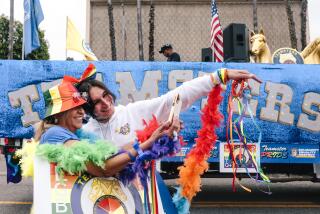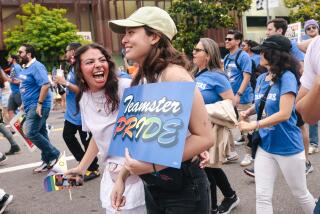United Pact Calls for Federal Judge to Settle Key Issues
United Airlines and its striking pilots each proclaimed frequently during the last few weeks that they would never accept a back-to-work agreement unless it “protected” those employees supporting their side in the dispute.
United, for example, insisted on awarding higher seniority status to employees who crossed the pilots’ picket line, giving them a prized advantage in bidding on open flight routes. It was, United senior Vice President Monte Lazarus said, “a matter of morality.”
Striking pilots, meanwhile, vowed to protect the employment rights of 500 pilot-trainees who had gone on strike after completing their training but before being hired. To drop that demand for the pilot-trainees, an Air Line Pilots Assn. spokesman said, “would be like flushing them down the tubes. We do not think that is an honorable settlement.”
But, as things turned out, the only way the two sides could reach Wednesday’s tentative back-to-work agreement was by dropping all those promises and throwing the complex and emotional back-to-work issues into the lap of a federal judge. An unfair labor practices suit filed by the union will become the vehicle the judge will use to decide the issues.
The tentative agreement, which was still being reviewed for final approval Thursday night by the pilots union’s Master Executive Council, gives no clear-cut acknowledgement of any of the stubbornly held positions that have prolonged the 29-day-old strike.
Instead, union spokesmen said, the settlement indicates that both sides will abide by the rulings of U.S. District Judge Nicholas Bua in Chicago, who today is scheduled to begin trial of the unfair labor practices lawsuit filed by the pilots against United in May.
Questions of Seniority
The suit includes questions of whether non-strikers can be given seniority above those who struck, whether the pilot-trainees who struck qualify as employees and whether United can pay new pilots hired to break the strike more money than other new hires.
The question of when United, which is now flying only about 14% of its 1,550 normal routes, will return to full strength remained uncertain Thursday. Until the union’s 27-member Master Executive Council gives final approval, the airline will not talk about service restoration.
A spokesman for the pilots union said the council was not expected to ratify the settlement until today. However, that ratification could be delayed further by separate back-to-work negotiations between United and the Assn. of Flight Attendants, which wants assurance that its members will not lose seniority for honoring the pilots’ picket lines.
The flight attendants and United continued to negotiate Thursday in Chicago. The pilots have said that they will not return to work until the attendants reach their own agreement.
Charles Craypo, chairman of Notre Dame University’s economics department and a specialist in collective bargaining, said the union’s agreement to let a court settle the dispute indicated that the pilots were worried about some of their members trickling back across the picket line during a long strike.
“It looks as though ALPA realizes they probably can’t force United,” Craypo said. “They crippled them, but it’s a matter of relative resources, and United just has a lot more than ALPA.”
In Chicago on Thursday, a spokesman at the union’s national strike headquarters, pilot Dave Jewell, said: “You had a situation where the union had made commitments and the company had made commitments to people, and neither side would give. You had a genuine stalemate in the truest sense of the word.”
Craypo said a prolonged strike could have threatened the pilots union’s future at United, the nation’s largest airline, because of the company’s plan to hire thousands of replacement pilots.
Craypo suggested that if the judge rules against the trainees but sides with the pilots in their demand that the airline’s seniority list be restored to its pre-strike status, the union “would have served the interests of its members” by agreeing to let the judge decide, but would “perhaps tarnish its image by not sticking with the new hires.”
Pilots, however, contended that the airline, not their union, had retreated in accepting this week’s tentative settlement. They noted that the airline had previously insisted that the union drop its demand for hiring of pilot-trainees before it would discuss a settlement.
The main economic provision of the strike, a two-tier wage scale to limit salaries of new pilots, was settled after the first week of the strike. It calls for newly hired pilots to be paid substantially less than currently employed pilots during their first five years, not during the first 12, as The Times reported earlier.
The question of whether newly hired pilots’ wages should merge with that of other pilots after five years of employment, or whether they should be kept lower for several more years, was left open for discussion in 1988, when the new contract expires.
More to Read
Sign up for Essential California
The most important California stories and recommendations in your inbox every morning.
You may occasionally receive promotional content from the Los Angeles Times.










